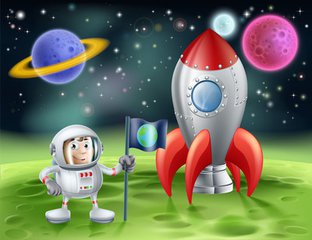Have you ever been on a really long trip, and it felt like it took forever to get where you're going?
你曾经有过一个长途旅行,感觉好像一生都到不了目的地吗?
Well, how would you like to take a long trip into space?
那么,你希望怎样完成一次远距离的太空旅行呢?
That might sound like something you've read about in a book or seen in a movie,
这听起来好像是书上读到或电影里看到的情景,
but for a select few people, it's real life!
但对于那些精选的少数人来说,这是他们的真实生活。
I'm talking about the astronauts who live in space for months at a time, on the Internationals Space Station.
我现在要说的就是那些在国际空间站一次要生活数月的宇航员
The International Space Station—or ISS for short—is in orbit above Earth.
国际空间站(ISS)在地球上面的轨道上运行。
Astronauts live and work up there doing science experiments and learning about life in space.
宇航员在里面工作和生活,他们会做科学实验和了解太空生活。
To get there, astronauts are carried up into space by rockets.
宇航员搭乘火箭进入太空,
And when they go home, they ride in space capsules that fall back to Earth.
乘坐太空船返回地面。
Let's take a closer look.
让我们近距离的了解一下。
Those big, flat shiny things are solar panels, and they provide energy for the space station.
这些闪闪的大平板是太阳能板,它们为空间站提供能源。
They capture sunlight and they turn it into electricity.
它们捕获阳光并将它转换成电能。
The space station uses that electricity to power lights and computers and everything else that makes the ISS go.
空间站中的电灯、电脑及其它支持其运行的东西都用这种电能。

This is a robot arm.
这是一个机械臂。
Astronauts inside the station use this arm by remote control, to fix things on the outside of the ISS.
在空间站内,宇航员通过远程操控它来修复空间站外的东西。
Although it might not look like it, the space station is kind of like a big house.
虽然它看上去不一样,但空间站就像一个大房子。
It has 5 bedrooms, 2 bathrooms, a kitchen—which astronauts call a galley,
里面有5间卧室,2间浴室和一间宇航员称为“galley”的厨房。
and they even have a laboratory, just like we do at the fort.
他们甚至有一间实验室,就像我们的沃斯堡。
But as you can imagine, life on the space station is a lot different than it is back home on Earth.
但是和你想的一样,空间站的生活与地面上的生活有着很大的区别。
For one thing, all of the water that astronauts use has to be flown up by rockets.
其中一件就是,宇航员的所有用水都要用火箭来运输,
Since it's so hard to get up there, water is only used for drinking and eating.
由于运水很难,所以只有在喝东西和吃饭时才能用水。
So astronauts don't take baths or showers with water.
因此宇航员不能用水洗澡。
Instead, they wash up with special washcloths.
但他们能用一种特殊的浴巾来清洗身体。
But probably the biggest difference is that there's much less gravity up in the space station than there is here on Earth.
但是最大的不同在于空间站里的重力远小于地球。
Instead of sticking to the ground like we do at home, astronauts up there just float around!
我们在地球上是贴着地面走,但宇航员只能到处漂。
So, in a way, it's a lot easier for the astronauts to move around, because there's less gravity.
从这点上来说,宇航员很容易移动,因为这里重力很小。
But after a couple of days in space, their muscles actually get weak.
但是在空间站待了一段时间后,宇航员的肌肉渐渐疲软。
So astronauts on the space station have to exercise at least two hours every day to give their muscles a workout.
所以空间站的宇航员每天必须至少锻炼俩小时,保证肌肉的功能。
But the rest of the time, the astronauts are conducting experiments!
但其余的时间,宇航员都在进行太空实验。
They'll study plants to see how they grow in space, and they'll study small animals, like fish,
他们会研究植物在太空怎样生长,他们也研究鱼之类的小动物,
to see how their muscles do in low gravity.
观察它们的肌肉在低重力下如何活动。
They even study how robots work in space.
他们甚至还研究机器人怎样在太空中工作。
Say hello to Robonaut 2.
跟机器宇航员2号打个招呼吧!
He's a robot, like Squeaks, who lives on the space station full time,
他跟吱吱一样,是个机器人,一直生活在空间站,
He's on board so astronauts can see if robots work as well in space as they do on Earth.
它现在甲板上,因为宇航员想要观察它的工作是否和在地球上一样,
R2, as his friends call him, can use tools, and even go on a spacewalk by himself.
机器宇航员2号(他的朋友们都这样叫它),能够使用工具,甚至能够独自进行太空行走。
Spacewalks are when astronauts leave the space station in a spacesuit,
太空行走是指宇航员穿上宇航服,离开空间站
to do work on the outside of the station.
去站外工作。
But they don't do them very often.
但是他们不经常这样做。
Spacewalks are only for when astronauts need to fix things on the ISS or to gather information for experiments.
他们只在需要修复空间站上的东西或是收集实验信息时才这样做。
So life on the International Space Station is hard work,
国际空间站上的生活很艰苦,
and it's really different than life at home.
并且不同于地球上的工作。
But if you ask me, the astronauts who get to go there are pretty lucky—
但是如果你问我的想法,我一定会说他们很幸运
because they actually get to live in space!
因为他们竟然在太空生活过!
Thanks for joining us on SciShow Kids.
欢迎收看儿童科学秀.
Maybe one day, if you work really hard, you can go to the ISS! See you next time.
如果你努力的话,也许某天你也能去国际空间站。下次再见!











